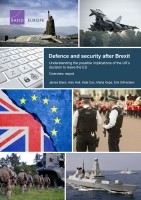| 来源类型 | Research Reports
|
| 规范类型 | 报告
|
| DOI | https://doi.org/10.7249/RR1786.1
|
| 来源ID | RR-1786/1-RC
|
| Defence and security after Brexit: Understanding the possible implications of the UK's decision to leave the EU — Overview report |
| James Black; Alexandra Hall; Kate Cox; Marta Kepe; Erik Silfversten
|
| 发表日期 | 2017
|
| 出版年 | 2017
|
| 页码 | 42
|
| 语种 | 英语
|
| 结论 |
International cooperation- Defence may be less immediately affected by Brexit than areas such as labour policy or trade. Much international defence cooperation takes place through NATO or bilaterally — as will remain the case after the UK leaves the EU.
- Analysis highlights the need for sustainable post-Brexit solutions for defence and security. This will require effective compromise and continued engagement between the UK and EU, which have both benefited from information-sharing, the joint work of bodies like Europol, and use of the European Arrest Warrant.
Strategic ambitions- Nonetheless, Brexit will require that both the UK and EU re-evaluate their strategic goals, what role they want to play in the world, and whether they have the capabilities and collaborative frameworks needed to achieve them.
Future of EU defence and security- The loss of the UK is a significant loss for the EU on defence. Some estimate that Brexit could reduce the EU's defence capabilities by a quarter. EU leaders are now working on plans to promote more EU defence integration, perhaps through a European operational headquarters — a plan long blocked by the UK while an EU member.
Regional implications- There are also important national and regional complications. France and Spain, for instance, are likely to reassess border relations at Calais and Gibraltar. For the UK, there are unique concerns facing Northern Ireland and Scotland.
Integrating defence and security into Brexit negotiations- Unlike in some other areas of policy, the UK is seen as a net contributor to European security and defence. This raises difficult questions for both sides about whether, when and how to leverage this in wider Brexit negotiations. Both sides risk becoming weaker and less secure if Brexit talks provoke a 'zero-sum' approach or a messy divorce.
|
| 主题 | Border and Port Security
; Counterterrorism
; European Union
; Military Budgets and Defense Spending
; North Atlantic Treaty Organization
; Nuclear Deterrence
; Politics and Government
; Security Cooperation
; United Kingdom
|
| URL | https://www.rand.org/pubs/research_reports/RR1786z1.html
|
| 来源智库 | RAND Corporation (United States)
|
| 引用统计 |
|
| 资源类型 | 智库出版物
|
| 条目标识符 | http://119.78.100.153/handle/2XGU8XDN/108647
|
推荐引用方式
GB/T 7714 |
James Black,Alexandra Hall,Kate Cox,等. Defence and security after Brexit: Understanding the possible implications of the UK's decision to leave the EU — Overview report. 2017.
|
|
文件名:
|
x1535046082414.jpg
|
|
格式:
|
JPEG
|

|
文件名:
|
RAND_RR1786z1.pdf
|
|
格式:
|
Adobe PDF
|
除非特别说明,本系统中所有内容都受版权保护,并保留所有权利。